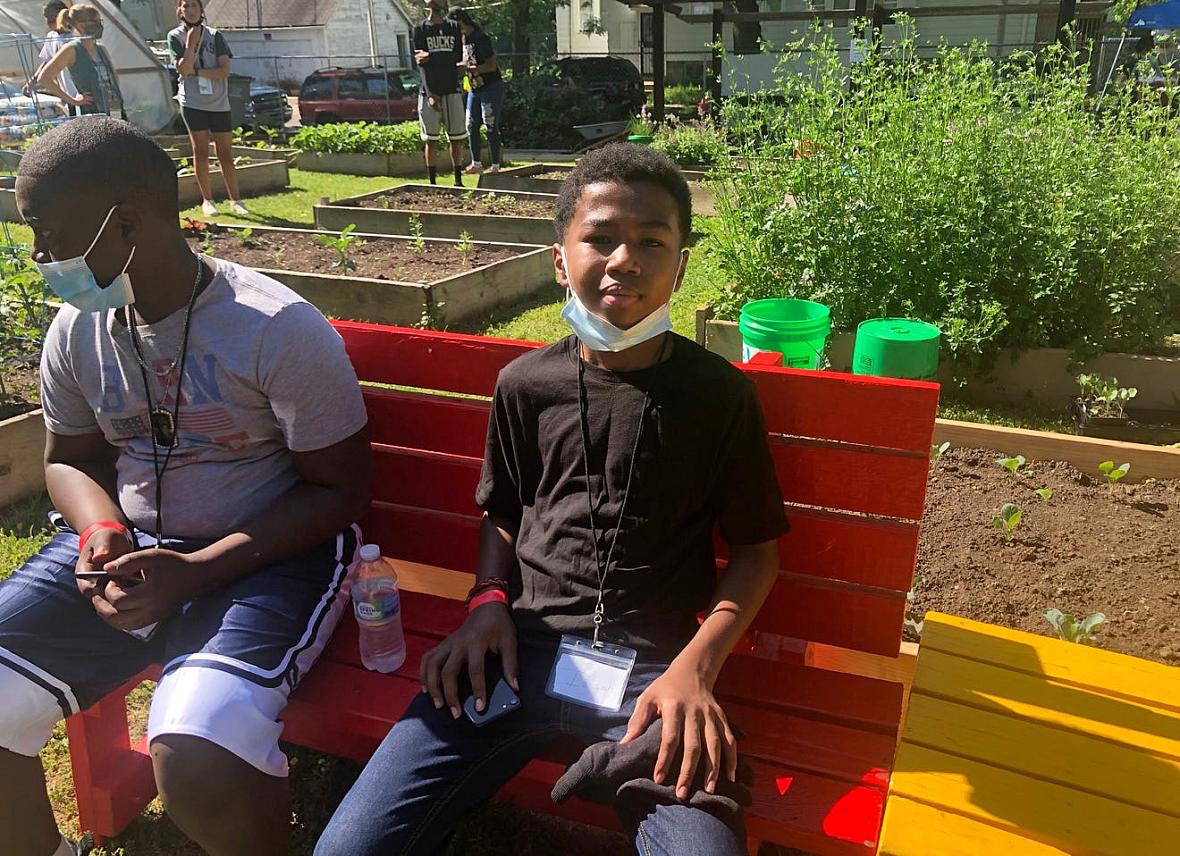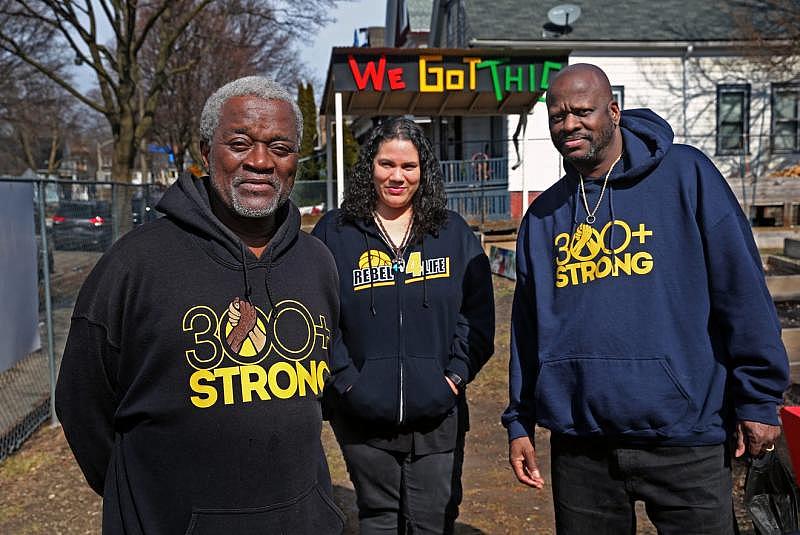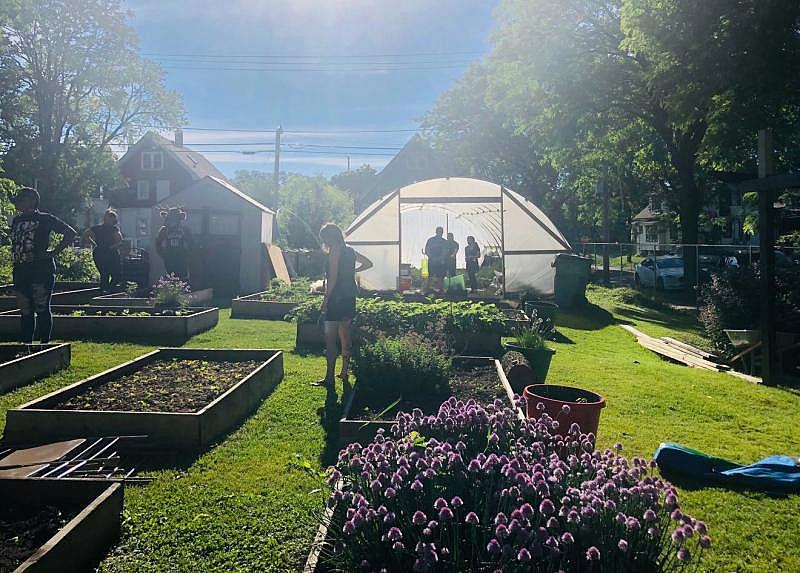'You can be anything you put your mind to': This garden continues to serve as a foundation to help Milwaukee boys achieve their dreams
James E. Causey’s reporting on this project was completed with the support of a USC Annenberg Center for Health Journalism grant.
Other stories in this series include:
I returned to the 53206 neighborhood — and saw some boys turn into men
Want to get involved in a community garden? It's not all weed-pulling.
Milwaukee couple make it their mission to give trauma victims the chance to talk and be heard
A reporter shares lessons from a Milwaukee garden trying to save at-risk boys
In Milwaukee's poorest ZIP code, fruits and vegetables become powerful weapons for saving young boys
How a Milwaukee community garden helped turn a struggling boy into 'Lil Obama'

Izaiah Cole, 14, takes a break after cleaning up several blocks near the We Got This urban garden with columnist James E. Causey. Izaiah is one of 40 boys who will work at the garden on the corner of N. 9th and W. Ring streets this summer. Boys working in the garden will earn $40 for four hours of work each week and also gain valuable mentoring from men in the community.
James E. Causey / Milwaukee Journal Sentinel
Izaiah Cole knows what he wants to be when he grows up.
"I want to be an engineer," the 14-year-old told a group of volunteers at the "We Got This" urban garden on N. 9th and W. Ring streets last Saturday.
Izaiah and two other boys have been working with founder Andre Lee Ellis for weeks to get the garden ready so other boys can learn to grow fruits and vegetables in an area long classified as a food desert.
The boys also walk the neighborhood, picking up trash and debris with mentors, and they get the chance to talk about whatever is on their minds, including trauma they may have experienced.
The garden had a soft opening June 5 to give volunteers a chance to see how things have changed since the pandemic forced it to operate on a limited basis last year with no boys. Starting this Saturday, the garden will take up to 40 boys; parents and guardians of boys ages 12-16 must preregister their children to ensure a spot.
Izaiah and two other boys picked up eight garbage bags of trash; turned soil and pulled weeds from the garden beds. After the clean-up, Ellis brought the boys up on stage to ask them what they wanted to be.
Izaiah told the crowd he was inspired to become an engineer by Tony Stark in the movie "Avengers: Endgame."
"I want to do something to improve the lives of people, and I think I can do it," Izaiah said.
"There is no reason why you can’t be an engineer," Ellis said. "You can be anything you put your mind to, and we are going to help to get you there."
A new partnership with Running Rebels
Andre Lee Ellis, left, who founded the We Got This garden program, along with Dawn Barnett, co-executive director, and her husband, Victor, executive director of the Running Rebels, gathered in March at the garden at W.Ring and N.9th streets. The two groups have merged. Angela Peterson/Milwaukee Journal Sentinel
Since my "Cultivating a Community" project on the garden was published in 2018, "We Got This" has grown tremendously. In March, Ellis formed a partnership with the Running Rebels community organization.
The nonprofit allies support one another at events and in schools; many of the youth are served by both organizations. With limited funding available, combining forces made sense and should keep both organizations strong and viable.
The merger allows Ellis a chance to work directly with Black boys year-round — not just in the summer.
Ellis’ garden has flourished.
In 2017, he had 24 garden beds, creating enough food for more than 50 boys to take some home to their families. Today, the garden has 38 beds; an orchard; a 25-by-45 foot hoop house; and work has begun on a 10-by-20 foot outdoor kitchen.
One of the newest additions to the We Got This urban garden is a 25-by-45 foot hoop house. The hoop house will allow boys to grow more fruits and vegetables for the 53206 ZIP zode. James E. Causey/ Milwaukee Journal Sentinell
And there’s more on the menu.
Ellis has teamed up with the Milwaukee School of Engineering to build a laundry facility, tiny bathroom, and a phone charging station in the garden.
"People in the neighborhood who may not have a washer and dryer will be able to do their laundry for free at the garden, and all they will need to do is give their time by volunteering," Ellis said. "The same thing with the phone charging station."
Creating a one-stop shop location will help to build community and get people more involved in the lives of the boys.
"We have to connect to our youth and guide them in the right direction," he said.
For the boys, the biggest change this summer is they will get a raise. Since the garden started in 2013, they were paid $20 a Saturday for four hours of work. This year, the boys will be paid $40.
The increase was made possible by the many donations made to the garden along with its partnership with Running Rebels.
"For many of the youth participating, this will be their first job. We want them to be able to put We Got This on their resume, because we are not only teaching them work skills, but we are also teaching them life skills," Ellis said.
The pandemic hurt Izaiah academically
On Saturday, I took Izaiah out for the neighborhood cleanup along 8th and Ring streets. Along the way we picked up liquor bottles, paper plates, and dozens of empty blunt wrap packages.
We talked about his life, how he got involved with We Got This and what he plans to do with the money he makes this summer. He will give some to his cousin who takes him to movies and share some with his mother, he said.
"She works hard to take care of me, and she told me about the program in the first place. She knows I like to help, and I love Mr. Andre. He’s the best because he always encourages me," Izaiah said.
Izaiah, who will be an eighth grader at Milwaukee Environmental Sciences Academy, told me the pandemic hurt him academically.
"My grades dropped some, because we moved to computer learning and I missed being at school with my friends and just being in school," he said.
Being around other boys in the garden will give him a chance to socialize and be around other young people his age.
In addition to school, we talked about his favorite pastime, going to the movies and his love for engineering and science. My wife went on the walk with us, and she explained to Izaiah how to extract DNA from a strawberry with regular household items. She had to do this experiment in her biochemistry class last semester.
"That sounds really cool," he said.
Back at the garden, Derrick “Baba” Rogers, program director for 414LIFE, shared a story about something that happened to him recently he thought was revealing.
Rogers was driving on Atkinson Avenue on the city’s north side when he saw a car coming up fast behind him at what seemed like 100 mph. He was only able to avoid being struck by the car by pulling quickly to the curb.
About a mile ahead, he noticed the same car at a gas station. He stopped, went inside, and talked to the young man who was driving so recklessly. "Hey son," he said, "it seems like you were in a bit of a hurry."
The young man apologized, by saying "My bad. But you saw me, didn't you?"
"I said, 'Yeah, I saw you,' " Rogers said.
The driver told Rogers, “You moved out of the way, didn’t you?”
Rogers said the young man smiled, paid for a candy bar and left the gas station.
"I thought about what it means to be seen and what it means to be invisible," Rogers said.
What the young man was really saying is that he felt powerless. When he was driving recklessly, he could be seen and make his presence known, Rogers said.
Too many young Black men in this city believe they can only been seen when they act out. When they don’t feel seen, they don’t feel valued.
"We have to see them not only visibly, but we have to see their possibilities," Rogers said.
The garden is one place where dreams can take root.
The next step for Izaiah: getting connected to mentors at MSOE.
"MSOE is already connected to the garden, now I have to get Izaiah connected to a mentor so he can see what engineering looks like," Ellis said.
How to get involved with the We Got This garden
To participate in the We Got This urban gardening program, go to: wegotthismke.com/ or runningrebels.org/.
The program operates 8 a.m. to noon every Saturday all summer. Pre-registration is required and limited to 40 boys ages 12-16.
Mask are required in the garden and temperature checks are taken.
Male volunteers are needed. To help out, just show up on Saturdays before 8 a.m.
[This story was originally published by Milwaukee Journal Sentinel.]
